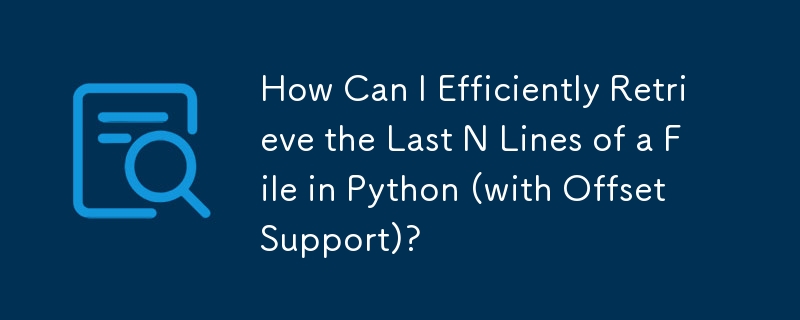 Backend Development
Backend Development
 Python Tutorial
Python Tutorial
 How Can I Efficiently Retrieve the Last N Lines of a File in Python (with Offset Support)?
How Can I Efficiently Retrieve the Last N Lines of a File in Python (with Offset Support)?
How Can I Efficiently Retrieve the Last N Lines of a File in Python (with Offset Support)?

Get Last N Lines of a File, Similar to Tail
Introduction
Log file analysis often involves the ability to view the most recent entries. This is typically achieved using the "tail" command, which retrieves the last n lines of a file. In this article, we will explore an implementation of a Python method that emulates the tail command, with support for offsets.
Tail Implementation
The proposed tail() method operates as follows:
- It reads n lines from the bottom of the file.
- It provides an offset parameter to skip a specified number of lines from the bottom.
def tail(f, n, offset=0):
"""Reads a n lines from f with an offset of offset lines."""
avg_line_length = 74
to_read = n + offset
while 1:
try:
f.seek(-(avg_line_length * to_read), 2)
except IOError:
f.seek(0)
pos = f.tell()
lines = f.read().splitlines()
if len(lines) >= to_read or pos == 0:
return lines[-to_read:offset and -offset or None]
avg_line_length *= 1.3This method estimates the average line length and adjusts it dynamically to optimize performance.
Alternative Approach
The original implementation makes assumptions about line length, which may not always hold true. Here's an alternative approach that avoids such assumptions:
def tail(f, lines=20):
total_lines_wanted = lines
BLOCK_SIZE = 1024
f.seek(0, 2)
block_end_byte = f.tell()
lines_to_go = total_lines_wanted
block_number = -1
blocks = []
while lines_to_go > 0 and block_end_byte > 0:
if (block_end_byte - BLOCK_SIZE > 0):
f.seek(block_number*BLOCK_SIZE, 2)
blocks.append(f.read(BLOCK_SIZE))
else:
f.seek(0,0)
blocks.append(f.read(block_end_byte))
lines_found = blocks[-1].count('\n')
lines_to_go -= lines_found
block_end_byte -= BLOCK_SIZE
block_number -= 1
all_read_text = ''.join(reversed(blocks))
return '\n'.join(all_read_text.splitlines()[-total_lines_wanted:])This method seeks backwards through the file one block at a time, counting line breaks to find the desired lines.
Conclusion
Both methods provide viable solutions for retrieving the last n lines of a file with offset support. The alternative approach avoids assumptions about line length and might be more efficient for large files.
The above is the detailed content of How Can I Efficiently Retrieve the Last N Lines of a File in Python (with Offset Support)?. For more information, please follow other related articles on the PHP Chinese website!

Hot AI Tools

Undresser.AI Undress
AI-powered app for creating realistic nude photos

AI Clothes Remover
Online AI tool for removing clothes from photos.

Undress AI Tool
Undress images for free

Clothoff.io
AI clothes remover

Video Face Swap
Swap faces in any video effortlessly with our completely free AI face swap tool!

Hot Article

Hot Tools

Notepad++7.3.1
Easy-to-use and free code editor

SublimeText3 Chinese version
Chinese version, very easy to use

Zend Studio 13.0.1
Powerful PHP integrated development environment

Dreamweaver CS6
Visual web development tools

SublimeText3 Mac version
God-level code editing software (SublimeText3)

Hot Topics
 How to solve the permissions problem encountered when viewing Python version in Linux terminal?
Apr 01, 2025 pm 05:09 PM
How to solve the permissions problem encountered when viewing Python version in Linux terminal?
Apr 01, 2025 pm 05:09 PM
Solution to permission issues when viewing Python version in Linux terminal When you try to view Python version in Linux terminal, enter python...
 How to avoid being detected by the browser when using Fiddler Everywhere for man-in-the-middle reading?
Apr 02, 2025 am 07:15 AM
How to avoid being detected by the browser when using Fiddler Everywhere for man-in-the-middle reading?
Apr 02, 2025 am 07:15 AM
How to avoid being detected when using FiddlerEverywhere for man-in-the-middle readings When you use FiddlerEverywhere...
 How to efficiently copy the entire column of one DataFrame into another DataFrame with different structures in Python?
Apr 01, 2025 pm 11:15 PM
How to efficiently copy the entire column of one DataFrame into another DataFrame with different structures in Python?
Apr 01, 2025 pm 11:15 PM
When using Python's pandas library, how to copy whole columns between two DataFrames with different structures is a common problem. Suppose we have two Dats...
 How does Uvicorn continuously listen for HTTP requests without serving_forever()?
Apr 01, 2025 pm 10:51 PM
How does Uvicorn continuously listen for HTTP requests without serving_forever()?
Apr 01, 2025 pm 10:51 PM
How does Uvicorn continuously listen for HTTP requests? Uvicorn is a lightweight web server based on ASGI. One of its core functions is to listen for HTTP requests and proceed...
 How to handle comma-separated list query parameters in FastAPI?
Apr 02, 2025 am 06:51 AM
How to handle comma-separated list query parameters in FastAPI?
Apr 02, 2025 am 06:51 AM
Fastapi ...
 How to teach computer novice programming basics in project and problem-driven methods within 10 hours?
Apr 02, 2025 am 07:18 AM
How to teach computer novice programming basics in project and problem-driven methods within 10 hours?
Apr 02, 2025 am 07:18 AM
How to teach computer novice programming basics within 10 hours? If you only have 10 hours to teach computer novice some programming knowledge, what would you choose to teach...
 How to solve permission issues when using python --version command in Linux terminal?
Apr 02, 2025 am 06:36 AM
How to solve permission issues when using python --version command in Linux terminal?
Apr 02, 2025 am 06:36 AM
Using python in Linux terminal...
 How to get news data bypassing Investing.com's anti-crawler mechanism?
Apr 02, 2025 am 07:03 AM
How to get news data bypassing Investing.com's anti-crawler mechanism?
Apr 02, 2025 am 07:03 AM
Understanding the anti-crawling strategy of Investing.com Many people often try to crawl news data from Investing.com (https://cn.investing.com/news/latest-news)...





